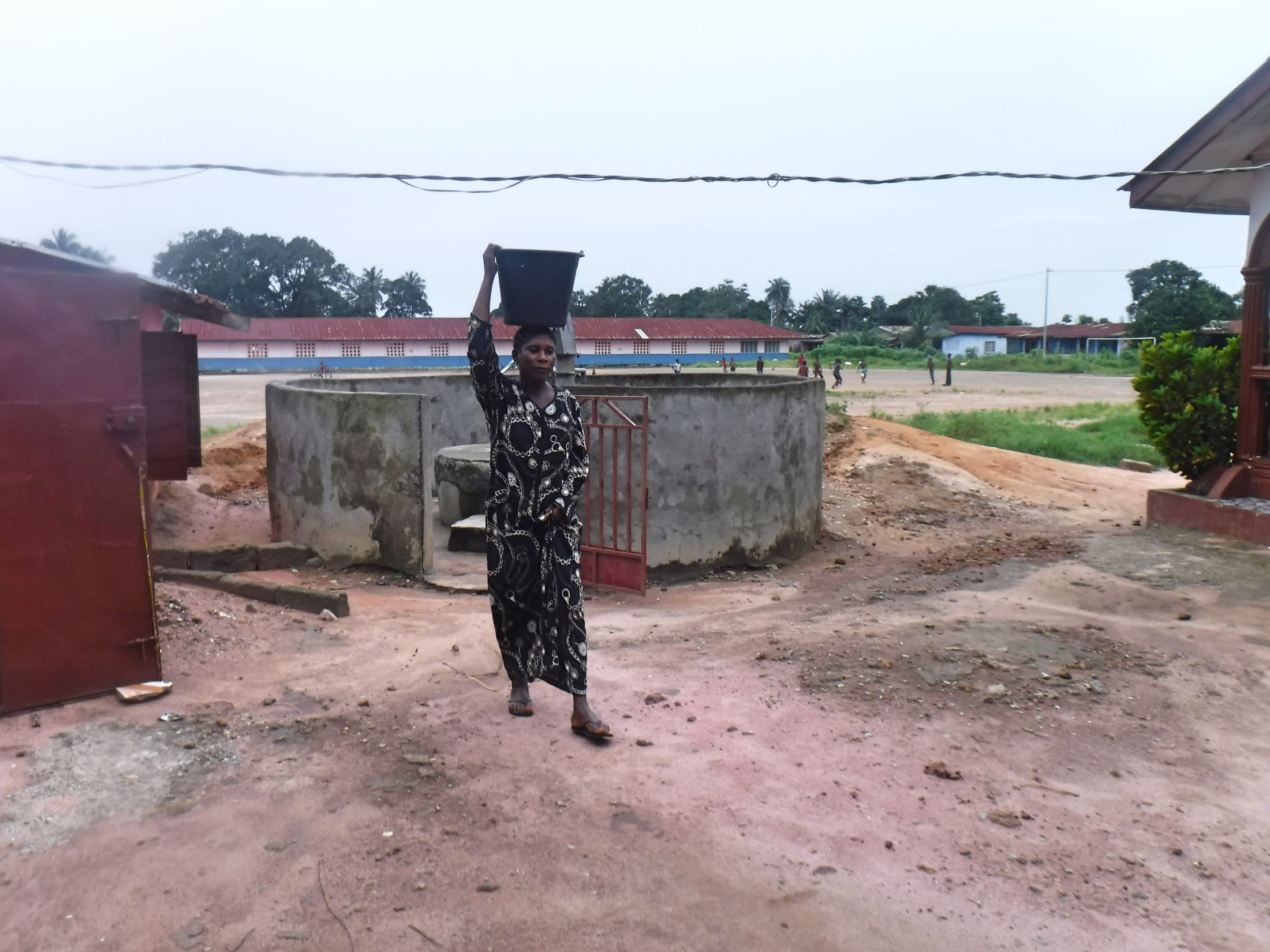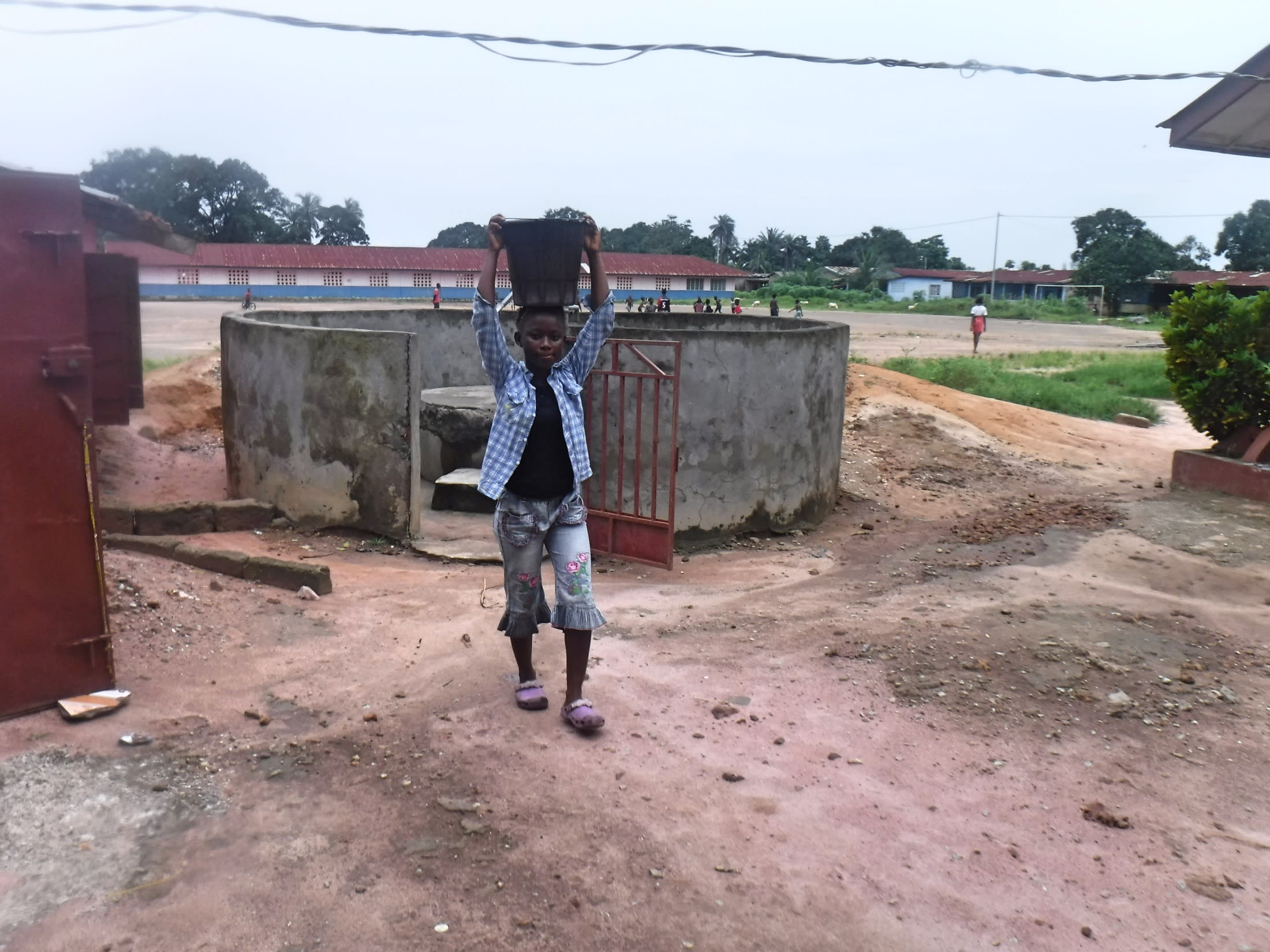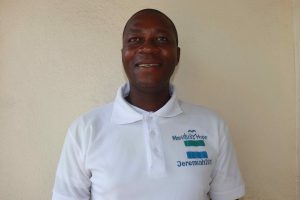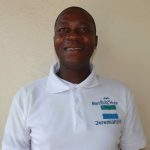May, 2023: Masoila Community Borehole Well Complete!
We are excited to share that there is now a safe, reliable borehole well at Masoila Community. As a result, community members no longer rely on unsafe water to meet their daily needs. We also conducted hygiene and sanitation training, which focused on healthy practices such as handwashing and using latrines.
"Before, I faced a big challenge [accessing] water in this community," said 30-year-old trader Adama Osman Kamara, whom we also interviewed when we first entered Masoila.

Adama (right, in the red shirt) splashes water with another woman at the new well.
"When I woke up early in the morning, I collected my rubber buckets and then rushed to the water well, and sometimes I [waited a long] time before I could fetch water," Adama continued. "The water that I fetched would not be enough to carry out my daily schedule. Sometimes people [would] form a queue at the water well, and the owner of the well locked the well. I [would] return home with empty jerrycans. But today, I have access to clean water, and I would like to say thanks. Now, I [will] complete my housework on time."
"I am happy today because [you] provided a new water well in my community," said 13-year-old Baindu M.

Baindu fills her container with water from the new well.
"I want to say a big thanks. Before, it [was] a very difficult task for me to get enough water home on time. The only water well in this community [was] not enough, and it [would get] overcrowded. Sometimes, I [would] not return home quick[ly], and the majority of people [would] not get enough water. The burden of fetching water [would become] worse for me. But today, [you have provided a] new water well in my community, and with this water well, I [will] drink safe and clean water."

Community members celebrate at the dedication ceremony.
We held a dedication ceremony to officially hand over the well to the community members. Several local dignitaries attended the ceremony, including representatives from the Port Loko District Council, the Ministry of Water Resources, and the Ward Council. Each official gave a short speech thanking everyone who contributed to this water project and reminding everyone to take good care of it. Then, Adama and Baindu made statements on their community's behalf. The ceremony concluded with celebration, singing, and dancing.
New Well
The drill team arrived the day before beginning work. They set up camp and unpacked all their tools and supplies to prepare for drilling the next day. The community provided space for the team to store their belongings and meals for the duration of their stay. The following day, work began.
Our team dug two pits next to the drill rig, one for the drill’s water supply and another for what the drill pulls out of the borehole. In some cases, we order a private supplier to deliver the water for drilling since water access is already challenging.

Day one of drilling began as the team mixed water with bentonite, an absorbent clay, in the two dug pits. Next, the team fixed a four-inch carbide-tipped bit to the five-foot-long drill stem. They started the mud pump to supply water to the drill rig so that drilling could begin!
After putting each five-foot length of drill stem into the hole, the team took material samples. We labeled the bags to review them later and determine the aquifer locations.
On the second day of drilling, the team expanded the hole and cleared it of mud. After reaching a total depth of 29 meters, the team forcefully pumped clean water into the well to remove any dirt and debris from the drilling process. We then protected the screened pipe by adding a filter pack. The team hoisted the temporary drilling casing to fortify the pipes with cement.

Testing the well's yield.
Next, we bailed the well by hand for three days before conducting a yield test to verify the water quantity. This well has a static water level of ten meters. With these excellent results, we installed a stainless steel pump. Water quality test results showed that this was clean water fit for drinking!

New Knowledge
Before conducting any hygiene training, we called and visited the local water user committee to understand the community’s challenges and lack of sanitation facilities. We shared the findings from our discussions with the committee members to help them make the necessary adjustments before the training began. For example, we identified households without handwashing stations or ones that may need to repair their latrines. With this information, community members worked together to improve hygiene and sanitation at home.
We also invited a nurse from the local clinic to help explain some topics and spread awareness about Sierra Leone's free vaccinations for children under five. She was instrumental in reinforcing each lesson.
After this preparatory period, we scheduled a time when members from each household using the water point could attend a three-day hygiene and sanitation training. We then dispatched our teams to the agreed-upon location to hold the meeting.

Training topics covered included handwashing and tippy taps, good and bad hygiene habits, teen pregnancy, worms and parasites, proper dental hygiene, menstrual hygiene, proper care of the well's pump, keeping the water clean, the cost recovery system, the importance of using dish racks and clotheslines, the importance of toilets, keeping latrines clean, balanced diets, the diarrhea doll, and disease transmission and prevention, COVID-19, Ebola, Hepatitis, HIV and AIDS.

The community nurse teaches the gathered community members.
One of the topics that participants were most interested to hear about was water-related disease, and specifically typhoid, which is prevalent in this area. One woman, Fatima, explained her story of contracting typhoid. She drank swamp water without boiling or treating it, and ended up with a runny stomach, skin rash, and general malaise. It wasn't until she started feeling very bad that her family brought her to the hospital, where she was diagnosed with typhoid. She cautioned her fellow community members not to ignore symptoms that don't seem severe and to go to the clinic or hospital whenever they feel poorly.

A facilitator shows the community an image of a properly constructed latrine.
Another topic that the community was proud to talk about was open defecation, which is the practice of relieving oneself out in the open rather than in a latrine or restroom. When a facilitator showed a picture of a child defecating behind a home rather than using the latrine, community members laughed and said this used to be a common sight in Masoila. However, since our in-country teams first made contact with them, they have built latrines for every household, which has made it easier for parents to train their young ones to use them. This alone should go a long way in curbing disease in Masoila.
"The new knowledge I have gained from these three days of training has helped me to change all my bad hygiene practices," said Adama Osman Kamara (quoted earlier). "This training has impacted me to know things that I did not know before, especially how I get typhoid, worms, diarrhea, and other diseases through contaminated water. The importance of family planning also [had a] great impact on me, [and] taking the children to the hospital when they are sick. I will make sure I sensitize others who did not have the opportunity to attend this training for them to know the dangers of bad hygiene deeds [and] that washing our hands with soap and clean water after using the toilet can save us from deadly diseases."
Conclusion
This project required a substantial collaboration between our staff, our in-country teams, and the community members. When an issue arises concerning the well, community members are equipped with the necessary skills to rectify the problem and ensure the water point works appropriately. However, if the issue is beyond their capabilities, they can contact their local field officers to assist them.
Also, we will continue to offer them unmatchable support as a part of our monitoring and maintenance program. We walk with each community, problem-solving together when they face challenges with functionality, seasonality, or water quality. Together, all these components help us strive for enduring access to reliable, clean, and safe water for this community.
With your contribution, one more piece has been added to a large puzzle of water projects. In our target areas, we’re working toward complete coverage of reliable, maintained water sources within a 30-minute round trip for each community, household, school, and health center. With this in mind, search through our upcoming projects to see which community you can help next!
Thank you for making all of this possible!






 Rehabilitation Project
Rehabilitation Project































